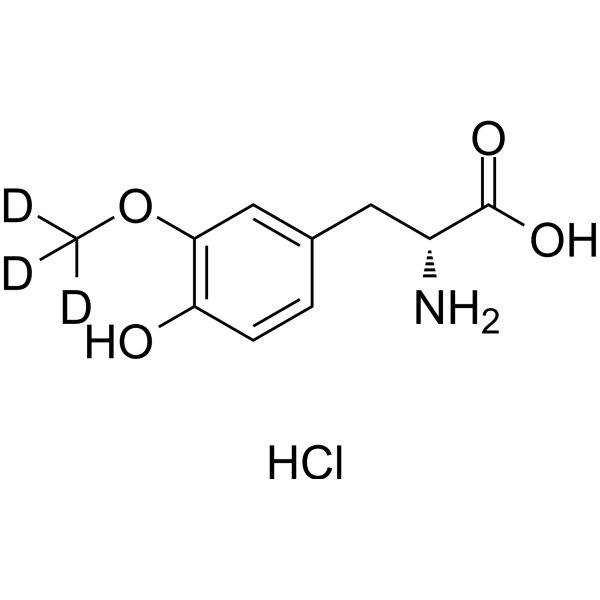(R)-3-O-Methyldopa-d3 hydrochloride
Modify Date: 2025-11-27 17:37:25

(R)-3-O-Methyldopa-d3 hydrochloride structure
|
Common Name | (R)-3-O-Methyldopa-d3 hydrochloride | ||
|---|---|---|---|---|
| CAS Number | 2714485-35-3 | Molecular Weight | 250.69 | |
| Density | N/A | Boiling Point | N/A | |
| Molecular Formula | C10H11D3ClNO4 | Melting Point | N/A | |
| MSDS | N/A | Flash Point | N/A | |
Use of (R)-3-O-Methyldopa-d3 hydrochloride(R)-3-O-Methyldopa-d3 hydrochloride is a deuterium labeled (R)-3-O-Methyldopa, and (R)-3-O-Methyldopa is an R-enantiomer of 3-O-Methyldopa. 3-O-Methyldopa is a metabolite of L-DOPA which is formed by catechol-O-methyltransferase (COMT). 3-O-Methyldopa competitively inhibits the pharmacodynamics of L-DOPA and dopamine[1][2]. |
| Name | (R)-3-O-Methyldopa-d3 hydrochloride |
|---|
| Description | (R)-3-O-Methyldopa-d3 hydrochloride is a deuterium labeled (R)-3-O-Methyldopa, and (R)-3-O-Methyldopa is an R-enantiomer of 3-O-Methyldopa. 3-O-Methyldopa is a metabolite of L-DOPA which is formed by catechol-O-methyltransferase (COMT). 3-O-Methyldopa competitively inhibits the pharmacodynamics of L-DOPA and dopamine[1][2]. |
|---|---|
| Related Catalog | |
| In Vitro | Stable heavy isotopes of hydrogen, carbon, and other elements have been incorporated into drug molecules, largely as tracers for quantitation during the drug development process. Deuteration has gained attention because of its potential to affect the pharmacokinetic and metabolic profiles of drugs[1]. |
| References |
| Molecular Formula | C10H11D3ClNO4 |
|---|---|
| Molecular Weight | 250.69 |